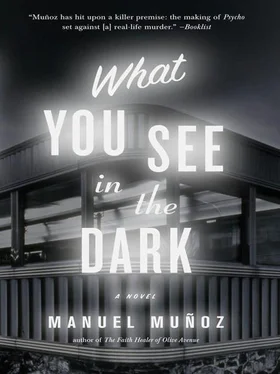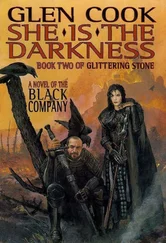Dan Watson kept the truck running after Teresa pointed to the green door. “Right there?” he asked.
“Yes,” she answered. “I live above the bowling alley.”
He peered up at the window, the blue curtains hanging. “I didn’t know that was up there.”
She opened the door. “Well, thank you for the ride.”
“You working tomorrow?”
“I am. Today was my day off.” She stepped out of the truck and held the door.
“Can I pick you up for lunch?”
She pressed the guitar against her. “Well …”
“Noon? Is that when Carson lets you off?”
“How do you know I work at the shoe store?” she asked, both astonished and a bit amused.
“Small town,” he said. “How’bout it?”
Something told her that she was supposed to hesitate, but the words bubbled on their own. “I’d like that,” she answered.
“Okay, then,” he said. “Noon it is.” He reached over the bench seat to close the passenger door. “I’ll see you then.”
Teresa scurried up the steps in the dark hallway, and for the remainder of the afternoon she lay on her bed and watched the room tilt from deep yellow to the orange of the west. She kept expecting to hear Cheno’s voice from the street, her windows open to break the heat, but by now she realized he’d been kept at whatever fieldwork he’d been given for the day. Still, she wanted to hear his call, his tiny knock at the foot of the stairs, but as evening came, she thought more and more about Dan Watson and found herself not wanting to see Cheno at all. She let the violet come as her mother had done in the past and didn’t turn on the light. From below, she thought, maybe Cheno would see the dark window and think she’d gone to bed early.
She ate in the dark — a simple dinner of leftover beans heated gently on the stove, and two tortillas. She drew a glass of water from the tap. She thought of Dan sitting down at a table in a large white house, plates and plates of food, and the silhouettes of his family gathering round.
When even the violet light disappeared, Teresa showered to cool herself off before sleep. She stretched her little radio closer to the edge of her bed, its cord extended as far as possible, and turned on the dial. The face of the radio glowed amber, now the only light in the room. She lay on the bed and listened, irritated by the announcer, but then grateful for his information: he told her the names of the songs and the singers singing them, and each time one caught her attention, Teresa closed her eyes and listened hard. She tried to memorize the words, even though they floated past too quickly, and caught lines here and there when they repeated as a chorus. Men cooed together sweetly, standing behind the one singer as if to help in his pleading: that was how men sang. Songs of pleading and promises, tomorrows, wedding days, and love eternal. All of them in voices so high pitched that they sounded nothing like the men downstairs: they sounded regal, silky, like looking at cigarette smoke but not having to smell it.
Downstairs, she thought she heard the faintest of knocks, and she reached over to turn down the radio. She heard it again, a timid one-two, and then the pause that meant Cheno was waiting, looking up at her window, and wondering if he should knock again.
She wanted to raise herself up on her elbows and look down from the window. He’d come all that way. It was so late. She could feel him waiting. But on the radio, a new song started. It was a man. And all evening, whenever a man sang, she pictured Dan Watson. If a woman sang, Teresa imagined herself. Even the backup singers had a role, two or three Dan Watsons behind her in complete harmony if the song required it, or sometimes two or three versions of herself, in different-colored cowgirl skirts, with Dan playing a guitar and all three versions of herself reaching out to him from the single microphone.
Downstairs, she could hear Cheno’s footsteps give in to his indecision. Her heart ached for him a bit as she pictured him walking the streets of Bakersfield, dark now, and she lay back down on the bed. Sleep wasn’t going to come tonight, not the way her eyes closed and she saw visions of the pickup truck or the ham-and-butter sandwich Dan had served her or his hands pressing her fingers on the fret board. She reached over and turned up the radio, listening awhile before finally noticing the balance struck by the DJ: sometimes a song would be low and quiet, the love lost, but then a girl group would come up next and chirp like birds about the wonders of a simple smile. They sang as if none of them had ever sat in a dark room with their mothers. They sang as if they always answered the faintest knock at the door from someone too timid to admit his own love. They had voices like sunny mornings, full of a hope so assured it wasn’t really hope anymore.
Could she ever sing like that? She wasn’t sure. But Teresa couldn’t manage the songs of desperation either. She had nothing within her that could match that complete loss of hope. She was alone and she was lonely, but she was not her mother. Could she make it up, imagine that pain? Which song could her mother sing, which one could most truthfully speak to what she carried inside? She wondered how much of one’s life mattered in giving a song conviction, how much could be heard by a stranger who looked at you knowingly. She closed her eyes and imagined herself singing with Dan. They would have to be, she told herself, happy songs. Unless she thought of Cheno. Then it would be different.
The hours passed and Teresa drifted into sleep, too heavy into it to reach over and turn off the radio. She woke when a ballad came on, so hushed and strange, as if Cheno himself had stolen into the room and started singing for her. Her sleep confused her, this voice and the words being sung. The voice registered defeat and weariness and surrender. She woke enough to picture Cheno and then a whole company of boys she had seen around Bakersfield. The dull, gangly son of the shoe store owner; the two high school boys who rode their bicycles together in the mornings, both of them rail-skinny and sporting thick black glasses. That voice could come out of any one of them in complete sincerity, she thought, but her mind floated back to Cheno.
“That was Ricky Nelson’s hit from last year, ‘Lonesome Town,’” said the announcer at the end of the song, and Teresa thought to reach over and turn off the dial. But she had loved this warm weight brought on by music as she tried to sleep, and she closed her eyes, hoping for another moment like it. She drifted in and out of sleep, at one point hearing a different announcer, with a voice barely a whisper, saying that it was nearly two in the morning, and for a brief moment she dreamed of rising to look out the window to see what Bakersfield would look like at that hour, who else the announcers were keeping awake, the stars above the dark city. That was her at the window, naked, and the men at the corner grocery store looking up but not whistling, as if seeing her like that at night was a gift they knew they shouldn’t question, just behold.
Morning trucks began coming around four o’clock, only a single engine now and then, but enough to wake her and open her eyes to the sky lightening to indigo. The radio kept playing. By the fourth truck she peered out at the corner to look for Cheno, rubbing the sleep out of her eyes, and sure enough, she saw him haggling with a driver, his white T-shirt almost glowing in the dawn light. When she saw him jump into the bed of the truck, she watched the brake lights disappear down the road, his head turning back to look at her window, and she wondered if he saw her. She rose soon after and took her time preparing her blouse and skirt for work, making coffee and two slices of toast. She bathed again to get rid of the night’s sweat, dried her hair, and put it up in a bun. It was only seven, still two hours before she had to be at work, but she gathered her purse and descended to the street.
Читать дальше












